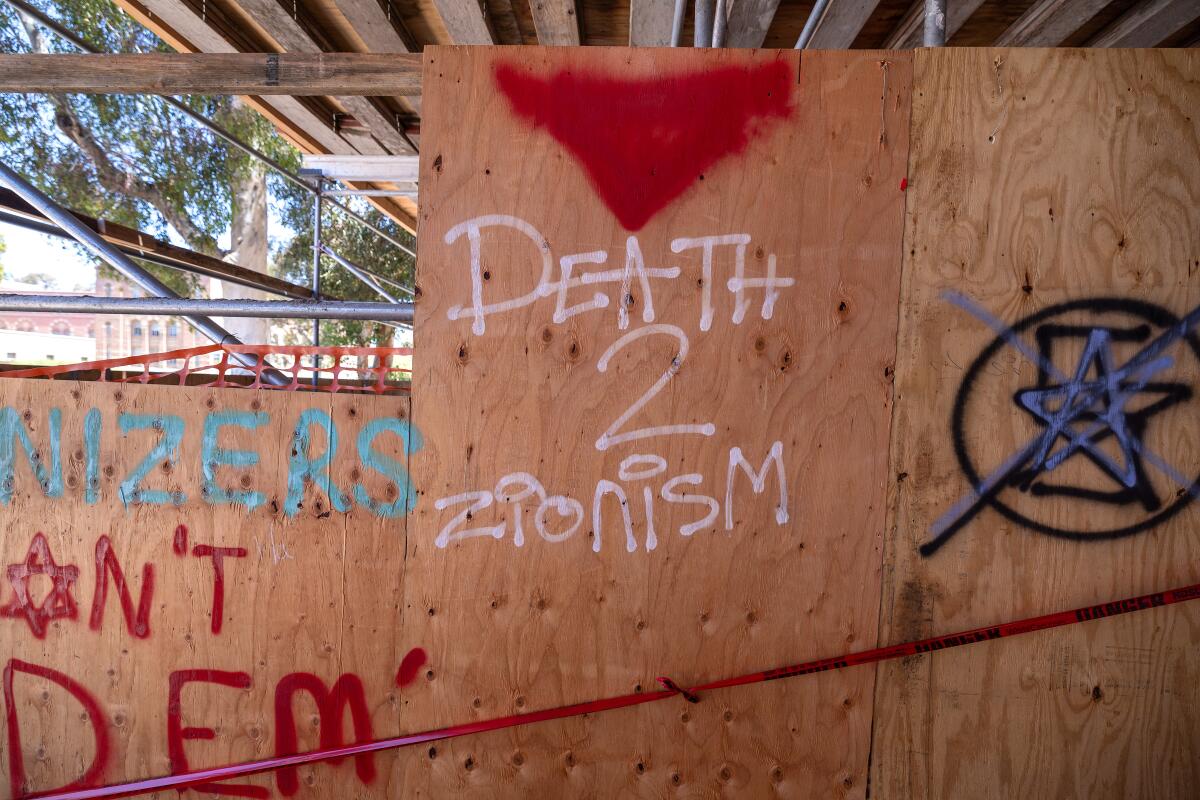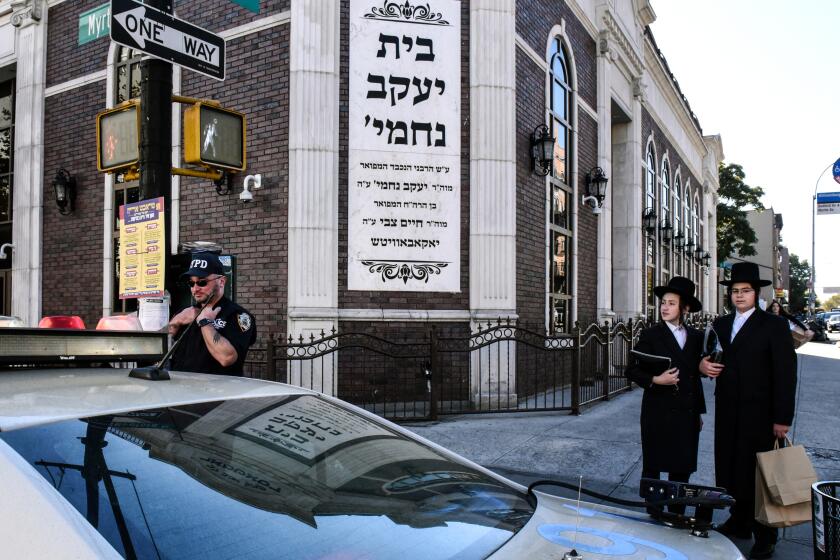Is Zionism patriotism or racism? Big disagreements over a word in use for 125 years

- Share via
WASHINGTON — In the many debates over language surrounding the war in Gaza, few words are as controversial as “Zionism.”
Its original, most basic definition is Jewish nationalism.
For many, that equates to the right of the Jewish people to have their own state and self-determination in an ancestral homeland after centuries of oppression and ostracism in much of the world. They view anti-Zionism as a fig leaf for bigotry and antisemitism.
For others, Zionism is a form of modern-day colonialism or racist manifest destiny — the attempt to justify the seizure of contested land in the name of God.
Here’s a review of the history of the word and how competing definitions are inflaming the debate over the Israel-Hamas war in the Gaza Strip.
Where did the term come from?
The term “Zionism” first came into use in the late 1800s. It built upon “Zion,” a biblical term for Israel and Jerusalem, and the name of a site in Jerusalem where the temple most historically revered in Judaism was constructed millennia ago.
Its use was championed by a Jewish Austro-Hungarian journalist, Theodor Herzl, at the turn of the 19th century. He made it the label of a movement to send European Jews to an area eventually known as British Mandate Palestine so they could begin forming a Jewish homeland.
Outraged by what he considered the dangerous and prejudicial treatment of fellow Jews in Vienna in the late 19th century, Herzl, trained as a lawyer and a prolific writer, established the Zionist Organization, which explored the mission of creating a Jewish state. The organization eventually had branches in several European cities and attempted to lobby the mostly royal rulers of the day to make the dream of statehood come true.
“Perhaps our ambitious young men, to whom every road of advancement is now closed, and for whom the Jewish state throws open a bright prospect of freedom, happiness, and honor, perhaps they will see to it that this idea is spread,” Herzl wrote in a pamphlet called “Der Judenstaat” (the Jewish State), which outlined his vision and led to his Zionist movement. It was published in 1896.
Considered the father of political Zionism, Herzl did not live to see a Jewish state. He died of heart disease in 1904.
Did Zionism always envision statehood for Jews in what is now Israel?
In the hearts of most early-day Zionists like Herzl, the ideal was to create their Jewish state in the land between what is now Jordan and the Mediterranean Sea. Yet there were other ideas.
In 1903, British colonial rulers in Africa floated the so-called Uganda plan, which would have offered a section of the East Africa Protectorate as a homeland for Jews. (The land would eventually become part of modern-day Kenya.) Some of Herzl’s followers were willing to consider this, but a visit to survey the land found it to be inhospitable.
The Soviet Union proposed a Soviet Jewish Republic in Crimea, Ukraine; Italian fascists proposed a settlement in Italian East Africa. The Nazis at one point proposed shipping Jews to Madagascar. All of those plans were rooted more in ridding the continent of Jews than in giving them a homeland.
In 1947, after World War II, the United Nations General Assembly officially partitioned British Mandate Palestine into a Jewish state and an Arab one; the latter was never established. Arab powers in the region rejected the decision and not long after were at war with the new state of Israel.
Israel-Hamas war: In Qatar’s capital, a compound housing Palestinian medical evacuees from Gaza is a living catalog of what war does to the human body.
How did the concept of anti-Zionism evolve in Soviet Russia?
In the years after Russia’s Bolshevik Revolution of 1917, many Russian Jews supported and participated in the country that became known as the Soviet Union. Initially, the Soviet Union was favorable to Zionism and the creation of an Israeli state.
But strains of anti-Jewish hatred that had long raged in Imperial Russia and led to waves of pogroms in the 18th and 19th centuries, as well as discriminatory residency and employment laws from Moscow to St. Petersburg, continued to permeate sectors of Soviet society.
As the years went on, and it became clear after World War II that the emerging Israel was going to hitch its wagon to the United States and the West, anti-Zionism became a more formal policy in the Soviet Union.
(The U.S. under President Truman was the first major power to recognize Israel, in 1948; Russia did the same, but Stalin reversed the decision within a year.)
Russia was home to tens of thousands of Jews, and for decades Soviet authorities refused to permit them to emigrate to Israel.
What was ‘Protocols of the Elders of Zion’?
One of the most notorious pieces of writing aimed at spreading hate and fear of Jews, “Protocols of the Elders of Zion,” was published in Russia in the early 1900s.
It was a fake document that purported to prove that Jews were a cabal sneakily trying to control the world through financial institutions, media and other centers of power. Though the text has been soundly and repeatedly discredited, copies still exist, and some of its portrayals of Jews remain frequent antisemitic tropes today.
What did Zionism come to mean for Jewish people — then and now?
Zionism to many Jewish people means, essentially, patriotism: a political ideology rooted in the establishment — and, later, promotion — of a refuge for Jews who throughout history had to escape pogroms, then a Holocaust aimed at wiping them out.
The Anti-Defamation League defines the concept this way: “Zionism is the movement for the self-determination and statehood for the Jewish people in their ancestral homeland, the land of Israel. The vast majority of Jews around the world feel a connection or kinship with Israel, whether or not they explicitly identify as Zionists, and regardless of their opinions on the policies of the Israeli government.”
There is not consensus, however, among Jews today over the precise definition of Zionism.
For many, it underpins Israel’s right to exist. For the more extreme, such as settlers occupying the West Bank and East Jerusalem land claimed by Palestinians, it is used to justify Jewish control of all the land, including the West Bank and Gaza Strip.
Religious Zionists, most believing in a divine right to govern, now have outsize influence in Israel. The war in the Gaza Strip is energizing their settlement push.
How do others view Zionism?
Over time, the definition and use of the word evolved and took on negative tones among critics of Israel. The U.N. formally declared Zionism a form of racism in a 1975 resolution, which it revoked 16 years later.
To Palestinians displaced by an emerging Israel, Zionism came to symbolize racism and exclusion from what they viewed as their homeland.
Is being anti-Zionist antisemitic?
On this question, there is abundant disagreement.
Many critics of Israel or Israeli government policy say opposing the expansion of the country’s control over land claimed by Palestinians is not an anti-Jewish or antisemitic position but one of fairness.
Yet many Jews would say denying their right to an unfettered homeland is indeed antisemitic. They say it is clear that the term “anti-Zionist” is being embraced by some anti-Israel demonstrators at U.S. college campuses as a politically correct cover for antisemitic intent.
Even before the Gaza war, antisemitism was on the rise. That has deeply unsettled many American Jews, accustomed to seeing the U.S. as a safe haven.
How has the term been used at campus protests?
At hundreds of pro-Palestinian protests on university campuses in recent weeks, the terms “Zionism” or “Zionist” have been hurled disparagingly against Jewish students and pro-Israel demonstrators.
At UCLA this month, demonstrators stopped Jewish students at checkpoints and demanded menacingly: “Are you a Zionist?” Some said protesters of any faith were welcome but not “Zionists”; one told The Times the word refers to those who adhere to “a very violent, genocidal political ideology that is actively endangering people in Gaza.”
A group of Jewish students at Columbia University — where demonstrations were intense and led to police being called onto the Manhattan campus to break up pro-Palestinian encampments — wrote an open letter this month expressing dismay at the way the term was being bandied about.
“We proudly believe in the Jewish people’s right to self-determination in our historic homeland as a fundamental tenet of our Jewish identity,” the letter, signed by several hundred students, stated. “Contrary to what many have tried to sell you — no, Judaism cannot be separated from Israel. Zionism is, simply put, the manifestation of that belief.
“We are proud to be Jews, and we are proud to be Zionists,” the students wrote.
In many cases, it seems that the competing definitions have made use of such a misunderstood word problematic.
Ned Lazarus, an international affairs professor at George Washington University in the nation’s capital, said “Zionism” is now used as a litmus test by both sides with an array of sometimes contradictory criteria and components, erupting into a war of narratives and becoming weaponized.
“It should be a question to open a conversation,” Lazarus said, “not shut it down.”
More to Read
Sign up for Essential California
The most important California stories and recommendations in your inbox every morning.
You may occasionally receive promotional content from the Los Angeles Times.














